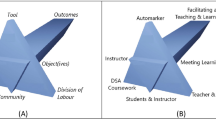Abstract
This paper discusses the use of conceptual structures in the design of computer-based assessment (CBA) tools for e-assessment of programming exercises. In STEM (science, technology, engineering and maths) subjects, universities often observe high dropout and failure rates among the first year students. There are a number of research initiatives that investigate the use of interactive teaching methods and e-learning technologies for improving STEM education. This paper presents a conceptual model of programming exercises and discusses more generally how conceptual structures can be employed for the implementation of CBA tools.
Access this chapter
Tax calculation will be finalised at checkout
Purchases are for personal use only
Preview
Unable to display preview. Download preview PDF.
Similar content being viewed by others
References
Ben-Ari, M.: Constructivism in computer science education. SIGCSE Bull. 30(1), 257–261 (1998)
Conway, M.A., Cohen, G., Stanhope, N.: Very long-term memory for knowledge acquired at school and university. Applied Cognitive Psychology 6, 467–482 (1992)
Hake, R.R.: Interactive-engagement versus traditional methods: A six-thousand-student survey of mechanics test data for introductory physics courses. American Journal of Physics 66(1), 64–74 (1998)
Hestenes, D., Wells, M., Swackhamer, G.: Force Concept Inventory. Phys. Teach. 30, 141–158 (1992)
Kortemeyer, G.: The Evolving Growth of LON-CAPA. Campus Technology (March 10, 2006), http://campustechnology.com/articles/2006/10/the-evolving-growth-of-loncapa.aspx
Leron, U., Dubinsky, E.: An Abstract Algebra Story. The American Mathematical Monthly 102(3), 227–242 (1995)
Levy, R.: Peirce’s Theory of Learning. Educational Theory 2, 151–176 (2007)
Mazur, E.: Peer Instruction: A User’s Manual. Prentice-Hall, New Jersey (1996)
McDermott, L.C.: Oersted Medal Lecture 2001: Physics Education Research-The Key to Student Learning. American Journal of Physics 69(11), 1127–1137 (2001)
Pears, A., Seidman, S., Malmi, L., Mannila, L., Adams, E., Bennedsen, J., Devlin, M., Paterson, J.: A Survey of Literature on the Teaching of Introductory Programming. SIGCSE Bull. 39(4), 204–223 (2007)
Prediger, S.: How to develop mathematics-for-teaching and for understanding: the case of meanings of the equal sign. J. Math. Teacher Educ. 13, 73–93 (2010)
Priss, U., Riegler, P., Jensen, N.: Using FCA for Modelling Conceptual Difficulties in Learning Processes. In: Domenach, Ignatov, Poelmans (eds.) Contributions to the 10th International Conference on Formal Concept Analysis (ICFCA 2012), pp. 161–173 (2012a)
Priss, U., Jensen, N., Rod, O.: Software for E-Assessment of Programming Exercises. In: Goltz, et al. (eds.) Informatik 2012, Proceedings of the 42. Jahrestagung der Gesellschaft für Informatik, GI-Edition, Lecture Notes in Informatics, p. 208, pp. 1786–1791 (2012b)
Pundak, D., Herscovitz, O., Shacham, M., Wiser-Biton, R.: Instructors’ Attitudes toward Active Learning. Interdisciplinary Journal of E-Learning and Learning Objects 5, 215–232 (2009)
Rey-Lopez, M., Brusilovsky, P., Meccawy, M., Diaz-Redondo, R., Fernandez-Vilas, A., Ashman, H.: Resolving the Problem of Intelligent Learning Content in Learning Management Systems. International Journal on E-Learning 7(3), 363–381 (2008)
Rongas, T., Kaarna, A., Kalviainen, H.: Classification of Computerized Learning Tools for Introductory Programming Courses: Learning Approach. In: Proceedings of the IEEE International Conference on Advanced Learning Technologies (ICALT 2004), pp. 678–680. IEEE Computer Society (2004)
Russell, G., Cummings, A.: Online Assessment and Checking of SQL: Detecting and Preventing Plagiarism. In: 3rd Workshop on Teaching Learning and Assessment in Databases (TLAD 2005). HEA-ICS, pp. 46–50 (2005)
Tall, D.: Cognitive Conflict and the Learning of Mathematics. In: First Conference of The International Group for the Psychology of Mathematics Education at Utrecht, Netherlands (1977)
Author information
Authors and Affiliations
Editor information
Editors and Affiliations
Rights and permissions
Copyright information
© 2013 Springer-Verlag Berlin Heidelberg
About this paper
Cite this paper
Priss, U., Jensen, N., Rod, O. (2013). Using Conceptual Structures in the Design of Computer-Based Assessment Software. In: Pfeiffer, H.D., Ignatov, D.I., Poelmans, J., Gadiraju, N. (eds) Conceptual Structures for STEM Research and Education. ICCS 2013. Lecture Notes in Computer Science(), vol 7735. Springer, Berlin, Heidelberg. https://doi.org/10.1007/978-3-642-35786-2_10
Download citation
DOI: https://doi.org/10.1007/978-3-642-35786-2_10
Publisher Name: Springer, Berlin, Heidelberg
Print ISBN: 978-3-642-35785-5
Online ISBN: 978-3-642-35786-2
eBook Packages: Computer ScienceComputer Science (R0)




